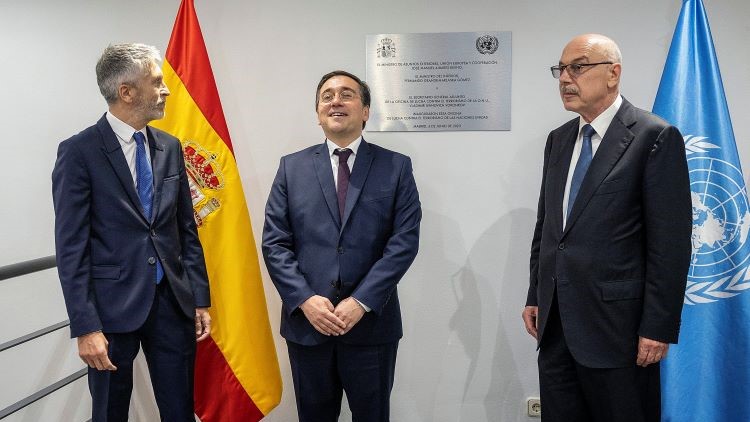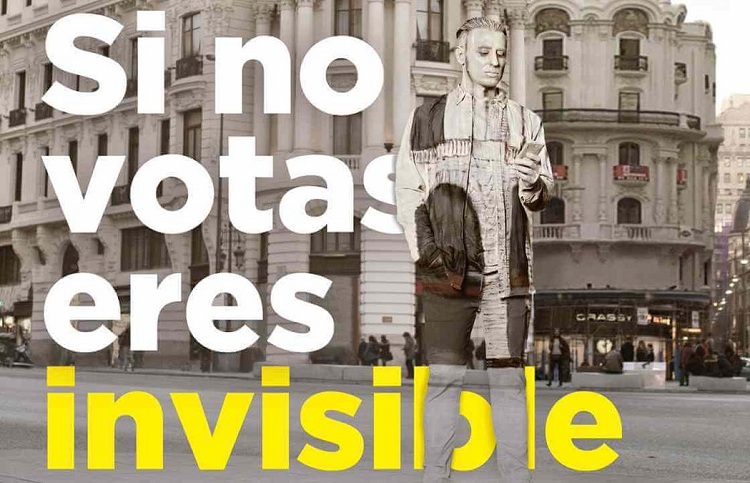The Diplomat
The Minister of Foreign Affairs, José Manuel Albares, the Minister of the Interior, Fernando Grande-Marlaska, and the United Nations Assistant Secretary General for Counter-Terrorism, Vladimir Voronkov, inaugurated yesterday the new UN Counter-Terrorism Office (UNOCT) in Madrid.
After the inauguration ceremony, as reported by both Ministries, Albares, Grande-Marlaska and Voronkov toured the premises of the new UNOCT office. During the event, the Minister of Foreign Affairs declared that this new headquarters “represents an important milestone after several years of close work with the United Nations to strengthen the fight against terrorism through multilateralism”.
For his part, the Minister of the Interior highlighted “Spain’s firm and unquestionable commitment in the fight against terrorism and the protection and shelter of its victims” and Voronkov thanked Spain for its support to the work of the UNOCT and stressed “the need to strengthen international cooperation against terrorism, an objective to which the Madrid Office of the UNOCT will actively contribute”.
Within the framework of his visit, and also in connection with this new office, Voronkov held meetings with the heads of the Spanish National Intelligence Center (CNI), Esperanza Casteleiro; of the National Security Department of the Presidency of the Government, General Miguel Angel Ballesteros; and of the Intelligence Center against Terrorism and Organized Crime of the Spanish Ministry of Interior (CITCO), General Manuel Navarrete.
The idea of establishing a regional UNOCT program office in Spain emerged during the Coordination Committee of the Global Counterterrorism Forum held in Malaga in March 2019 and was broached by Fernando Grande-Marlaska and Vladimir Voronkov in the margins of the High Level International Conference on Human Rights, Civil Society and Counter-Terrorism, organized in May 2022 by the UN and the Government of Spain in the same Andalusian city.
The agreement for the implementation of the office was signed on June 22, 2022 in New York, one day after the Council of Ministers approved its signature and provisional application at the proposal of the Ministries of the Interior and Foreign Affairs.
The UNOCT headquarters in Madrid, as detailed in the agreement, will focus especially on the protection of vulnerable targets – including critical infrastructure and public places -, the prevention of violent extremism – also through sports and youth participation -, the promotion and protection of human rights and support for victims of terrorism. The office will also facilitate bilateral and multilateral cooperation in the fight against terrorism and “will also be able to take advantage of Spain’s experience and good practices in the fight against terrorism to help implement these programs in the beneficiary countries,” the government stated.
Voronkov’s presence at the head of the agency led to a small political scuffle between the Government of Pedro Sánchez and the main opposition party in September 2022, after the PP deputy Pablo Hispán accused José Manuel Albares in Congress of “whitewashing” Vladimir Putin’s regime with his decision to meet that same month in New York with the Russian diplomat to sign the headquarters agreement. Foreign Affairs immediately responded that Voronkov has “Russian nationality” but “does not represent Russia either at the UN or in any other way” and rejected, “without nuance, discriminations based on nationality, Russian nationality included.”
Vladimir Voronkov was appointed deputy secretary-general of the UN Counter-Terrorism Office in June 2017 after more than 30 years of experience in the foreign service of the Russian Federation. Prior to his appointment, he served as Ambassador Permanent Representative of Russia to international organizations based in Vienna.
The United Nations Office of Counter-Terrorism was established on June 15, 2017 by a decision of the United Nations General Assembly. The creation of the Office was the first major institutional reform undertaken by UN Secretary-General António Guterres following his report on the UN’s capacity to assist Member States in the implementation of the UN Global Counter-Terrorism Strategy. Since its inception it has been headed by Voronkov.







